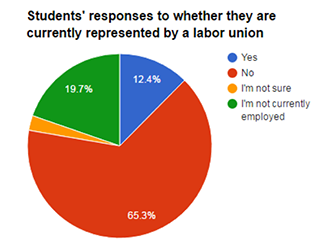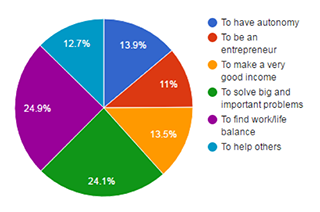Week 1: What is Your Dream for Your Future of Work?
Very few people are represented by labor unions nowadays. This video briefly discussed local innovations (beyond traditional labor unions) aimed at improving the working circumstances of everyday people.
Indeed, many powerful ideas to improve employment often come from everyday people who see a need and uncover a way to address it. For example, Glassdoor encourages transparency by letting employees rate their employers. An up-and-coming website called Beansprock tries to help people identify jobs they will like. Other sites, like OpenIdeo, try to crowd-source solutions to a broad range of social issues, including incentivizing corporate social responsibility.
So, having seen this material, what are your dreams for your job and your career? I grew up on a small dairy farm milking cows and baling hay with my father and siblings. Early on he said to all of us: Work hard, get as much and the best education as you can and you will have a better life than we can provide. That’s the traditional view of the “American Dream”—that every generation should be able to improve on the standard of living of their parents.
But is that your “Dream"? Does it still work for your generation? Do you want something else from your work, job, career, and personal/family life? This assignment gives you a way of answering that question for yourself. Then answer the following questions in brief.
- How similar or different are your aspirations, expectations for your future jobs, career, and family life compared to your parents? Compared to your grandparents?
- Why do you think they are different or similar?
- Summarize the information you’ve collected by providing a one paragraph statement of your personal “Dream” (American or otherwise depending on where you live!)

Students’ responses to the question: What is your primary aspiration for work?

Week 1 Poll Data
Students’ responses to the question: Are you currently represented by a labor union?
- 12.4% Yes
- 65.3% No
- 2.6% I’m not sure
- 19.7% I’m not currently employed
Students’ responses to the question: What is your primary aspiration for work? Following are some of the potential aspirations for work. Though many may be appealing to you, please select the option that is “most” important to you.
- 13.9% To have autonomy
- 11% To be an entrepreneur
- 13.5% To make a very good income
- 24.1% To solve big and important problems
- 24.9% To find work/life balance
- 12.7% To help others
Discussion Forum: High Road Employment Practices
In the student discussion forum, we encouraged dialogue about how to promote “high road” employment practices (such as those demonstrated by Southwest Airlines), training, and higher levels of economic security. Why do some organizations continue to use low road employment practices? What are the best ways to promote change?
Students were asked to post ideas, but also follow-up on others’ comments to participate in constructive dialogue with classmates.










